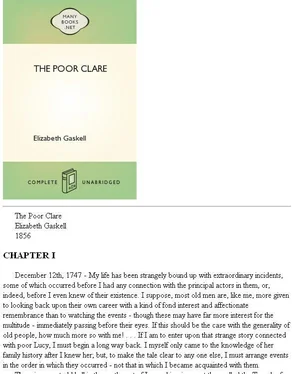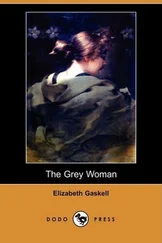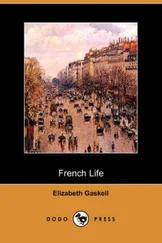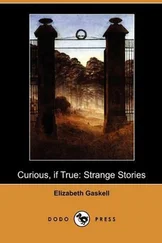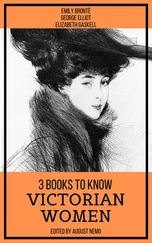The Poor Clare
by Elizabeth Gaskell
December 12th, 1747 — My life has been strangely bound up with extraordinary incidents, some of which occurred before I had any connection with the principal actors in them, or, indeed, before I even knew of their existence. I suppose, most old men are, like me, more given to looking back upon their own career with a kind of fond interest and affectionate remembrance than to watching the events — though these may have far more interest for the multitude — immediately passing before their eyes. If this should be the case with the generality of old people, how much more so with me!. . If I am to enter upon that strange story connected with poor Lucy, I must begin a long way back. I myself only came to the knowledge of her family history after I knew her; but, to make the tale clear to any one else, I must arrange events in the order in which they occurred — not that in which I became acquainted with them.
There is a great old hall in the north-east of Lancashire, in a part they called the Trough of Bolland, adjoining that other district named Craven. Starkey Manor-house is rather like a number of rooms clustered round a grey, massive, old keep than a regularly-built hall. Indeed, I suppose that the house only consisted of a great tower in the centre, in the days when the Scots made their raids terrible as far south as this; and that after the Stuarts came in, and there was a little more security of property in those parts, the Starkeys of that time added the lower building, which runs, two storeys high, all round the base of the keep. There has been a grand garden laid out in my days, on the southern slope near the house; but when I first knew the place, the kitchen garden at the farm was the only piece of cultivated ground belonging to it. The deer used to come within sight of the drawing-room windows, and might have browsed quite close up to the house if they had not been too wild and shy. Starkey Manor-house itself stood on a projection or peninsula of high land, jutting out from the abrupt hills that form the sides of the Trough of Bolland. These hills were rocky and bleak enough towards their summit; lower down they were clothed with tangled copsewood and green depths of fern, out of which a grey giant of an ancient forest-tree would tower here and there, throwing up its ghastly white branches, as if in imprecation, to the sky. These trees, they told me, were the remnants of that forest which existed in the days of the Heptarchy, and were even then noted as landmarks. No wonder that their upper and more exposed branches were leafless, and that the dead bark had peeled away, from sapless old age.
Not far from the house there were a few cottages, apparently of the same date as the keep; probably built for some retainers of the family, who sought shelter — they and their families and their small flocks and herds — at the hands of their feudal lord. Some of them had pretty much fallen to decay. They were built in a strange fashion. Strong beams had been sunk firm in the ground at the requisite distance, and their other ends had been fastened together, two and two, so as to form the shape of one of those rounded waggon-headed gipsy-tents, only very much larger. The spaces between were filled with mud, stones, osiers, rubbish, mortar — anything to keep out the weather. The fires were made in the centre of these rude dwellings, a hole in the roof forming the only chimney. No Highland hut or Irish cabin could be of rougher construction.
The owner of this property at the beginning of the present century, was a Mr. Patrick Byrne Starkey. His family had kept to the old faith, and were staunch Roman Catholics, esteeming it even a sin to marry any one of Protestant descent, however willing he or she might have been to embrace the Romish religion. Mr. Patrick Starkey's father had been a follower of James the Second; and during the disastrous campaign of that monarch he had fallen in love with an Irish beauty, a Miss Byrne, as zealous for her religion and for the Stuarts as himself. He had returned to Ireland after his escape to France, and married her, bearing her back to the court at St. Germains. But some license, on the part of the disorderly gentlemen who surrounded King James in his exile, had insulted his beautiful wife, and disgusted him; so he removed from St. Germains to Antwerp, whence, in a few years' time, he quietly returned to Starkey Manor-house — some of his Lancashire neighbours having lent their good offices to reconcile him to the powers that were. He was as firm a Catholic as ever, and as staunch an advocate for the Stuarts and the divine rights of kings; but his religion almost amounted to asceticism, and the conduct of those with whom he had been brought in such close contact at St. Germains would little bear the inspection of a stern moralist. So he gave his allegiance where he could not give his esteem and learned to respect sincerely the upright and moral character of one whom he yet regarded as an usurper. King William's government had little need to fear such a one. So he returned, as I have said, with a sobered heart and impoverished fortunes, to his ancestral house, which had fallen sadly to ruin while the owner had been a courtier, a soldier, and an exile. The roads into the Trough of Bolland were little more than cart-ruts; indeed, the way up to the house lay along a ploughed field before you came to the deer-park. Madam, as the country-folk used to call Mrs. Starkey, rode on a pillion behind her husband, holding on to him with a light hand by his leather riding-belt. Little master (he that was afterwards Squire Patrick Byrne Starkey) was held on to his pony by a serving-man. A woman past middle age walked, with a firm and strong step, by the cart that held much of the baggage; and, high up on the mails and boxes, sat a girl of dazzling beauty, perched lightly on the topmost trunk, and swaying herself fearlessly to and fro, as the cart rocked and shook in the heavy roads of late autumn. The girl wore the Antwerp faille, or black Spanish mantle, over her head; and altogether her appearance was such that the old cottager, who described the procession to me many years after, said that all the country-folk took her for a foreigner. Some dogs, and the boy who held them in charge, made up the company. They rode silently along, looking with grave, serious eyes at the people, who came out of the scattered cottages to bow or curtsey to the real Squire, 'come back at last, and gazed after the little procession with gaping wonder, not deadened by the sound of the foreign language in which the few necessary words that passed among them were spoken. One lad, called from his staring by the Squire to come and help about the cart, accompanied them to the Manor-house. He said that when the lady had descended from her pillion, the middle-aged woman whom I have described as walking while the others rode, stepped quickly forward; and, taking Madame Starkey (who was of a slight and delicate figure) in her arms, she lifted her over the threshold, and set her down in her husband's house, at the same time uttering a passionate and outlandish blessing. The Squire stood by, smiling gravely at first; but when the words of blessing were pronounced, he took off his fine feathered hat and bent his head. The girl with the black mantle stepped onward into the shadow of the dark hall, and kissed the lady's hand; and that was all the lad could tell to the group that gathered round him on his return, eager to hear everything, and to know how much the Squire had given him for his services.
From all I could gather, the Manor-house, at the time of the Squire's return, was in the most dilapidated state. The stout grey walls remained firm and entire; but the inner chambers had been used for all kinds of purposes. The great withdrawing-room had been a barn; the state tapestry-chamber had held wool, and so on.
Читать дальше
